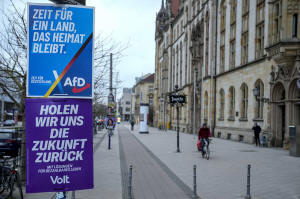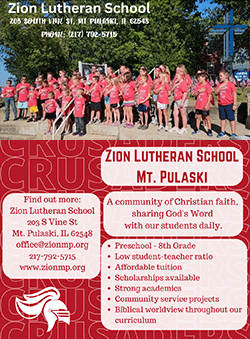Migrant groups say racist attacks increase in German city after deadly
Christmas market violence
 Send a link to a friend
Send a link to a friend
 [February 19, 2025]
By FANNY BRODERSEN and STEFANIE DAZIO [February 19, 2025]
By FANNY BRODERSEN and STEFANIE DAZIO
MAGDEBURG, Germany (AP) — When Haben Gebregergish first immigrated to
the German city of Magdeburg seven years ago, the Eritrean immigrant was
walking to the supermarket with her child when an intoxicated woman
approached her on the street.
At the time, Gebregergish did not speak German well enough to comprehend
what the woman was saying. But Gebregergish says that when the woman
threw a beer bottle at her head, she immediately understood.
It was one of her first encounters with racism, but certainly not the
last. In the aftermath of a deadly attack at a Christmas market in
Magdeburg late last year, Gebregergish and other migrants who have
settled in the city say they have experienced a sharp increase in racism
and anti-immigration sentiments.
“We are the same as you,” Gebregergish said earlier this month. "We are
not different. Just like you, we have feelings. Sometimes we are sad,
sometimes we are happy, just like everyone else.”
The Christmas market violence was one of five high-profile attacks
committed by immigrants in the past nine months that have made migration
a key issue as the country heads toward an early election on Sunday. The
suspect, a Saudi doctor, drove into the holiday market teeming with
shoppers and left five women and a 9-year-old boy dead and 200 people
injured.

The suspect arrived in Germany in 2006 and had received permanent
residency, and authorities say the suspect does not fit the usual
profile of perpetrators of extremist attacks. He is being held in
custody as authorities investigate him.
Just one day after Dec. 20 violence, there was a large right-wing
demonstration in Magdeburg, and verbal and physical attacks on people
with a migrant background have increased significantly in the city since
then, according to the German-Syrian Cultural Association in Magdeburg.
“The migrant community and the advice centers report that attacks have
increased by more than 70% here in the city," said Saeeid Saeeid, who
came to Germany from Syria seven years ago and is a member of the
association. "Racism already exists here and everywhere. But it has
increased enormously since the attack.”
Ketevan Asatiani-Hermann, newly elected chair of the board for the
Advisory Council for Integration and Migration in Magdeburg, said
victims of racist attacks in the city often do not feel support from
politicians or police.
[to top of second column]
|

An election poster of the far-right anti-immigrant party Alternative
For Germany party AfD, with with the slogan reading "It's time for a
country that is still a home country", is displayed in a street, in
Magdeburg, Germany, Friday, Feb. 7, 2025. (AP Photo/Ebrahim Noroozi)

“The hatred has always been there, people just didn’t dare to say it
so clearly before,” said Asatiani-Hermann, who came to Magdeburg in
2011 from Georgia.
Officers sometimes target or search the victims first before the
perpetrator, she alleged, and they also worry reporting an attack
could have a negative impact on their residence status.
The Magdeburg Police Department did not respond to multiple requests
for comment.
Mayor Simone Borris, in a statement, said: “Cohesion and community
are fundamental values of a city that are inviolable." The mayor
also referred media to online services for migrants, and said the
city's Cooperation with the Advisory Council for Integration and
Migration will be expanded.
Magdeburg is located in the former communist east, an area where the
far-right and anti-immigrant Alternative for Germany (AfD) party has
its highest support. The party is polling in second place going into
the upcoming election with about 20% support and is fielding its
first candidate to lead the country.
Even though it’s highly unlikely to take a share of power soon, it
has become a factor that other politicians can’t ignore and has
helped shape Germany’s debate on migration.
The election's outcome — and a potential gain in influence for AfD —
could have a large impact on Magdeburg's politics and everyday life,
Asatiani-Hermann said.
Saeeid said the city's migrants feel alone, and want to hear
directly from their elected officials to address their concerns.
"We will not allow Magdeburg to become a playing field for racism
and hatred,” he said.
__
Dazio reported from Berlin.
All contents © copyright 2025 Associated Press. All rights reserved |